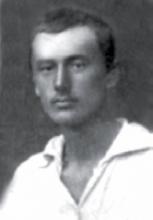Yuri Ivanovych Yanovsky (August 27 [O.S August 14] 1814 – February 25, 1861) was a Ukrainian poet and novelist, one of the greatest romantics in Ukrainian literature of the first half of XX century, military journalist and editor of Ukrainian literature magazine. He was studying electrical engineering at the Kiev Polytechnic Institute for two years (1922-1923).
Yuri Yanovsky was born in the village of Maiierove (now the village of Nechaivka, Kompaniivsk district, Kropyvnytskyi region) in rural family. In search for better life his family moved to Yelisavetgrad in 1908. As an adolescent Yuri was studying in Yelysavethrad realschule. Later at the same time he was working at administrative department of county Executive Committee and county statistical bureau and studying mechanical engineering technician school. In 1922 Yuri Yanovsky settled in Kyiv and entered the faculty of electrical engineering of Polytechnic Institute.
His first poem “The Sea” signed by George Ney was published in Russian in Proletarian Truth on May 1, 1922. It established him as a creator of “marine” poetry in Ukrainian literature. The poem “Ringing” was released signed with his real name as a part of “Beautiful Ut” collection in 1928. Then he turned to prose. Since 1924 he was working as a reporter of Bolshevik.
During 1925–1926 Yuri Yanovsky was working as an art editor at Odessa film studio. Since 1927 he lived in Kharkiv and worked as an editor of All-Ukrainian Photo-Cinema Directory (VUFKU). In 1939 he returned to Kyiv. Romantic short stories of the early period of writer were collected in two books “Mammoth tusks” (1925) and “The blood of the earth” (1927). His first novel “Master of the ship” proved his excellent skills in the descriptions of marine romantic. The novel “Turn” appeared in 1927. The chief novel of writer The Four Sabers (1931) portrayed the spontaneous people's movement of Ukraine in days of the liberation struggle. This writing triggered off biting criticism and subsequently was illegal for a long time. Later Yanovsky returned to the subject of revolution in Ukraine in the novel collection “Riders” (1935), however that time he sided with official point of view. One of the novels “A double circle” was devoted to representation of tragic fratricidal conflicts in time of revolution.
During World War II Yuri Yanovsky was working as an editor of Ukrainian literature magazine and military journalist. In 1945 he worked as reporter at the Nuremberg trials.
The book "Kyiv Stories" (1948) awarded the State Prize of the USSR (stories "A front", "Kiev Sonata", "Fight for Man", "The way to France," "Dynastic question," "Under the apple tree" and others.).
The most significant post-war work of Yanovsky was the novel "Water" (1947), in which the writer embodies the idea of immortality of the nation, reviving after the military disaster. At first publication of the writing was perceived positively, but after some time it had suffered deeply unfair criticism organized by L. Kaganovich. Yanovsky had to remake the novel in accordance with the principles of socialist realism and republish it in a weaker version called "Peace" (1956).
On February 16, 1954 the premiere of the play "Daughter of the prosecutor" took place.
Yuri Yanovsky died on February 25, 1954. He was buried at the Baikove Сemetery (plot number 2).

